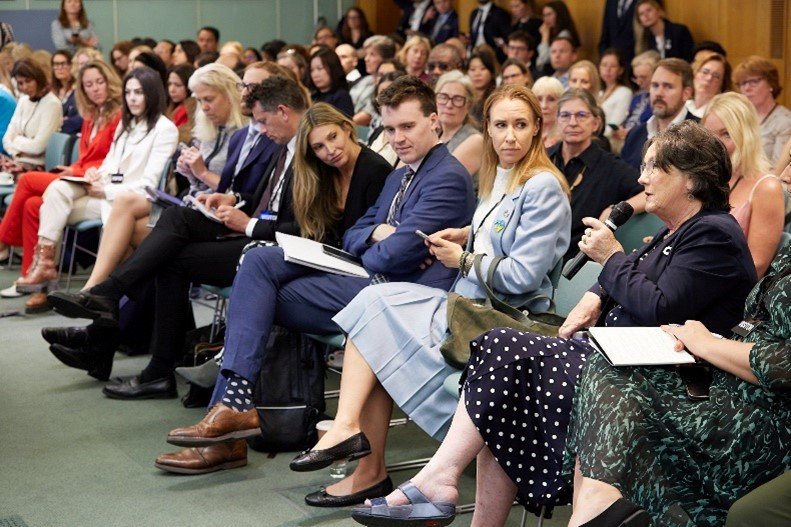APPG hosts ‘Business and the Sustainable Development Goals’ conference in Parliament -6 July
On Thursday 6th July, the APPG hosted its 4th Annual ‘Business and the Sustainable Development Goals’ event in Parliament, back in person after a couple of years of the event taking place virtually due to the pandemic. The SDGs are not just for government, but for business too, and the event was an opportunity to share best practice and highlight the importance of multi-stakeholder cooperation and partnerships in the delivery of the Goals.
In partnership with the International Chamber of Commerce (ICC), the Coalition for Global Prosperity (CGP) and the UN Global Compact, there were speeches and panel discussions on the topic of ‘Halfway to 2030’, with businesses sharing how they are using the SDGs as a framework for their environmental, social and governance policies, and reflecting on next steps at the midway point between the adoption of the Goals in 2015, and their delivery date in 2030.
The conference was an opportunity for businesses, Parliamentarians and representatives from government to come together to discuss what have been some of the the major challenges in the delivery of the SDGs, as well as lessons learnt and reflections on how businesses and government, both local and national, can deliver better within the framework of the Goals going forward.
A video address from UN. Deputy General Secretary Amina Mohamed
Following opening remarks from U.N. Deputy General Secretary Amina Mohamed, via video message, and APPG co-chairs Theo Clarke MP and Lord McConnell, a keynote speech was delivered by Minister for International Development Andrew Mitchell, where he officially launched the Flags Campaign, which will see government buildings lit up and flags displayed across the country to show support for the Sustainable Development Goals at the time of the SDG Summit in New York in September.
The Minister also gave further detail on the forthcoming White Paper on the SDGs, for which he is seeking cross-party backing, and spoke about the role of local government and the private sector in delivering on the SDGs. He referenced his desire to see more funding for climate adaption finance within the Bridgetown Agenda, and mentioned his particular support for empowering women and girls through the SDGs, and for the role of the private sector in lifting people out of poverty.
Keynote speech from Minister for International Development Andrew Mitchell
Then, a panel discussion chaired by Theo Clarke MP, with Stuart Brice from KPMG, Kate Gibson from Diageo and Kempton White from The Emissions Capture Company, discussed lessons learnt from the delivery of the SDGs from within their respective organisations, as well as more general reflections on how businesses can incorporate the SDGs into their framework for ESG work.
After a short coffee break, a speech from Steve Kenzie, from the UN Global Compact outlined the work of the UK chapter of the UN Global Compact, which is supporting thousands of businesses across the UK to implement the SDGs into supply chains and governance practices.
A second panel, chaired by the Secretary of the ICC Chris Southworth, and with Jenny McInnes from HSBC, Abdullah Alim, Head of Project 2030 and Lord Moynihan, Chairman of engineering firm Amey, discussed ‘What comes next?’ with regards to the SDGs post-2030. They discussed the need to sensitise businesses to long-term planning, the importance of public-private sector partnerships in the delivery of the Goals and the need to demonstrate to businesses there is ‘enlightened self-interest’ in adopting the SDGs as part of their business practices.
The panel then took questions from Parliamentarians and business representatives in the audience, and there was a ‘show of hands’ from the audience about whether the framework for the SDGs should be changed – with a majority firmly against! It was clear the amount of support in the room for the SDGs to continue as a framework for local and national government, and for businesses small and large, as we work together in partnership towards the 2030 agenda.
A question from Pauline Latham MP
Once the panel discussions concluded, there was time for more coffee and networking, with representatives from Parliament, local government and a variety of businesses taking the opportunity to discuss how their organisations are implementing on the SDGs, and sharing ideas about how they can improve their sustainable business practices as we look towards 2030 and beyond.
The APPG would like to thank the International Chamber of Commerce, the Coalition for Global Prosperity and the UN Global Compact for their support in putting on this event, and hopes to build on the success of this year’s conference, with future conferences on the role of businesses in delivering the SDGs going forward.



